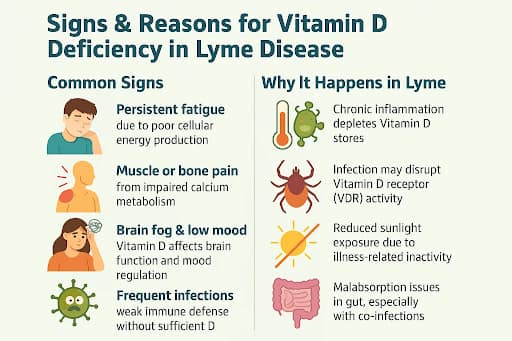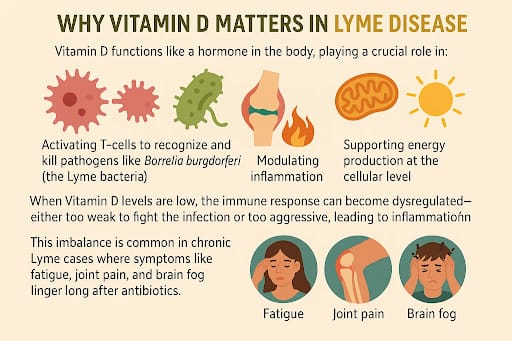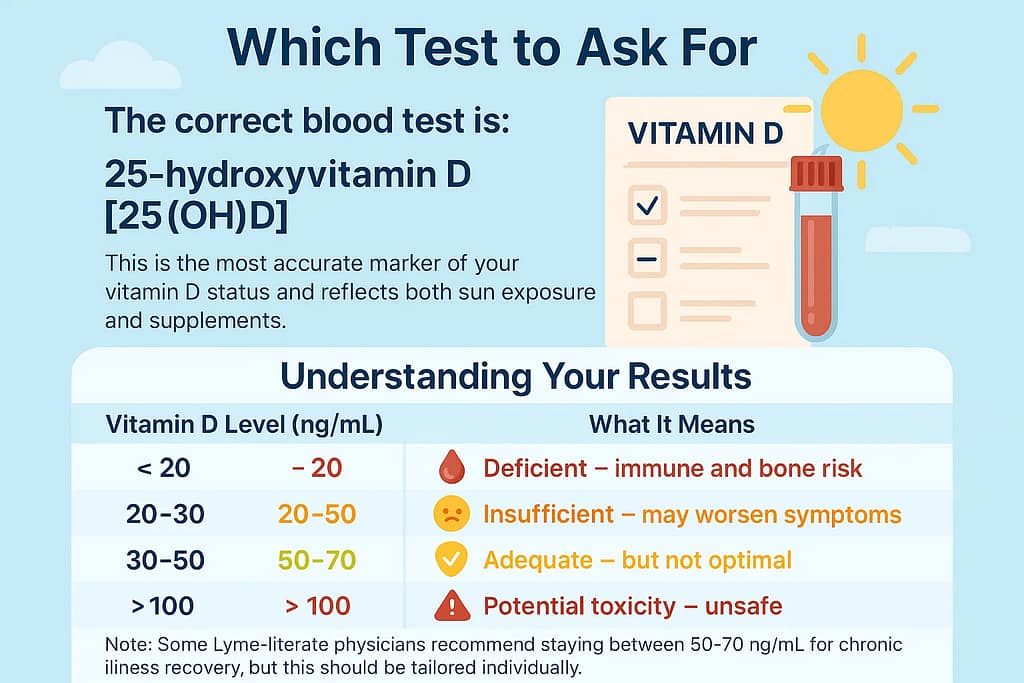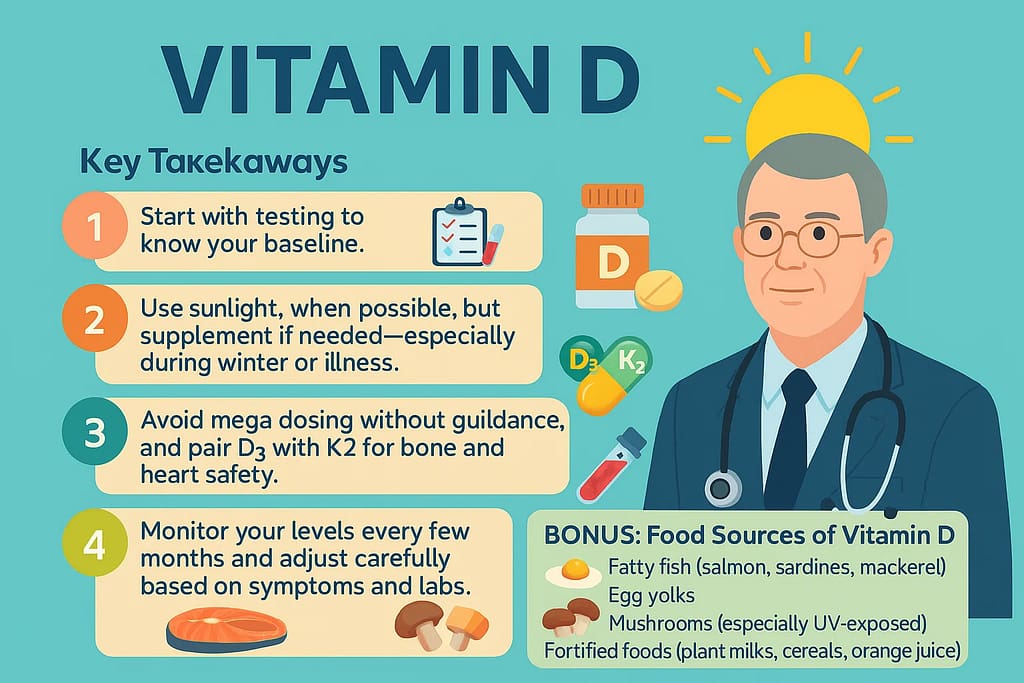
Fatigue is one of the most affecting and persistent symptoms of Lyme disease. The infections, inflammation, and immune dysfunction are usually blamed. I agree to that, totally. However, it takes a toll and impacts on the other nutritional components of the body too. One of the linked nutrients is Vitamin D deficiency.
For individuals struggling silently with Lyme disease with worsening fatigue, muscle weakness, mood changes, and altered immune responses.
Let us find out if that overlooked component will lead to the road of recovery!
The Overlooked Connection: Lyme Disease & Vitamin D

- Vitamin D is linked to healthy bones. It has a significant impact on inflammation and immune function. This nutrient may have unspoken significance for Lyme disease patients, particularly those with chronic symptoms.
- Lyme disease and vitamin D may be connected through immune regulation and inflammation control.
- Low vit D levels are common in patients with chronic infections like Lyme disease. Thereby, an active Lyme infection can impair the body’s ability to maintain adequate vitamin D levels.
- Some clinicians recommend checking vit D status during Lyme disease treatment.
- Even with the sun exposure, a lot of individuals have Vitamin D deficiency. This is an area of concern since vitamin D helps in activation of immune cells that fight infections and reduces elevated levels of inflammatory responses– which are amongst two major problems.
- Lyme infections worsen fatigue, joint pain, and brain fog in chronic stages as it interferes with the body’s ability to process Vitamin D. Chronic symptoms healing is also slowed due to the low levels of vitamin D.
- At the same time, excessive Vitamin D intake can also be quite dangerous, for individuals especially with weakened immune systems. This is for the same reason, physicians advise assessing blood levels and implement the usage of supplements according to the patient’s requirements.
- To state precisely, Vitamin D is simply an overlooked component and has a relative role in the process of Lyme disease recovery.
What the Research Says

- Vitamin D modulates innate and adaptive immunity, enhancing T-cell activation and production of antimicrobial enzymes.
- There is increased susceptibility to infections and poor immune regulation. Chronic Lyme patients may benefit from monitoring vitamin D deficiency.
- Chronic Lyme disease can lead to long-term immune system disruption.
- Infections such as Tuberculosis, HIV, Lyme disease decreases the circulating Vitamin D.
- Vitamin D is prevented from getting utilized.
- Chronic conditions suggest that low vitamin D relates with fatigue, pain, and cognitive issues.
- Fatigue and brain fog are more evident in such patients.
- Supplementation minimizes relapse frequency and symptoms worsens.
- Patients with deficiency gained the most benefits, especially with inflammation- related symptoms.
Testing Your Levels: What You Need to Know

Checking your Vitamin D levels reveals a critical piece of the puzzle of Lyme disease.
- Morning is the ideal time to test your Vitamin D levels, during consistent daily routines.
- Avoid testing within 24- 48 hours of taking a large supplement dose, as it might alter the test results.
- Seasons matter! So in order to stay relevant with the dosage forms, opt for the test.
- Other factors that can affect the results are chronic infections such as Lyme, Obesity or any kidney/ liver issues.
Sunlight, Supplements, and Safety

There are smart ways one should opt for without going over the board. If you manage Lyme disease– it is vital to correct the deficiency safely and effectively. But more is not always better.
- Sunlight: Your skin produces Vitamin D when it is exposed to UV rays from sunlight. Make sure to accommodate time in order to maintain healthy levels. The limitation with individuals dealing with Lyme disease is that they avoid sun due to fatigue or elevated sensitivity– so this may not be enough on its own.
- Supplements: If the sunlight is not definite or enough, Vitamin D supplements can be an easy and measurable option. Avoid self- medication as it may cause toxicity and damage to kidney or calcium imbalances in the body.
Consult a doctor or medical professional if you are simultaneously managing Lyme, autoimmune diseases, or chronic fatigue.
Conclusion
- When living with Lyme disease, it’s easy to focus only on treating the infection—but your body’s nutrient foundation matters just as much.
- Vitamin D is more than just a “sunshine vitamin“—it’s a critical immune modulator that can impact how your body handles chronic illness and fatigue. If you’re experiencing lingering tiredness, brain fog, or body aches, checking your Vitamin D levels might reveal an easy-to-correct contributor.
- With proper testing and support from your healthcare provider, addressing a deficiency could help lighten the load of Lyme—and help you reclaim a little more energy for your journey forward.
- Some protocols combine antibiotics with vitamin D and other immune-supportive supplements.
What’s Next for You?
Ready to explore a more complete path to recovery?
References
- Stricker RB, Fesler MC. Issues in the diagnosis and treatment of Lyme disease. Infect Dis Clin North Am. 2008;22(2):319–339. Link.
- Henriksen A, et al. Vitamin D and its role in fatigue mitigation: a narrative review. J Nutr Health. 2023;45(4):210–222. Link.
- Crystal J. Lyme disease and the effects of vitamin D. Global Lyme Alliance Blog. 2022 Aug 16.Link
- Christensen L. How good nutrition can help you recover from Lyme disease. LymeDisease.org. 2021 Mar. Link
- Dressler F, Whalen JA, Reinhardt BN, Steere AC. Western blotting in the diagnosis of Lyme disease. J Infect Dis. 1993;167:392–400. doi: 10.1093/infdis/167.2.392. PubMed


